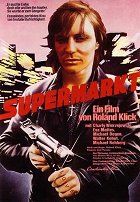Director:
Roland KlickCámara:
Jost VacanoMúsica:
Peter HessleinReparto:
Charly Wierczejewski, Michael Degen, Eva Mattes, Walter Kohut, Hans-Michael Rehberg, Eva Schukardt, Witta Pohl, Hans Irle, Alfred Edel (más)Sinopsis(1)
Young slacker Willi makes his way in Hamburg as a petty criminal and hustler. He finds temporary refuge with a committed journalist, a wealthy homosexual, and finally, a seedy hoodlum. He feels exploited by all of them. The only person who seems to sincerely like him is sex worker Monika. To try to escape the misery with her and her young son, Willi gets involved in the armed robbery of a supermarket cash transport. (Berlinale)
(más)Reseñas (1)
Roland Klick developed the screenplay about the aimlessness of lost youths and the dark side of West German society based on his own experience of offering shelter to a street kid in his own apartment for several years. The film follows seventeen-year-old Willi, who can’t hold down a job, constantly comes into conflict with the police and hangs around on the streets of Hamburg. On the one hand, he doesn’t know what he wants, but at the same time he knows very well that he doesn’t want to do what others tell him to do. His frenetic flight from the authorities and from himself leads him from the grime and decadence of the streets, through the establishments of trendy society, to an opulent home in the Blankenese residential district, back and forth in a frantic spiral. In the course of his impulsive odyssey, he encounters various characters who represent possible life paths that he could take, but who also bear the marks of fitting into a particular social pigeonhole. Supermarket shows the key principles of the director’s style in its purest form. On the one hand, Klick seeks out for his characters the ideal actors who fit their image, while at the same time incorporating the actors’ observed gestures and distinctive expressions into the characters. So, instead of trying to portray the characters, the actors directly personify them. He also lets the actors naturally enter the scene, which he has thought out to the smallest detail, and gives the cue to start filming only at the ideal moment. Thanks to this method, Klick’s films radiate unbridled energy and almost documentary authenticity. According to the director himself, he conceived the film as one long take, so he also needed a cameraman who could keep pace with the protagonist. He found just such a cameraman in photography expert Jost Vacano, who created a custom gyroscopic system enabling smooth shots with a camera in motion. Vacano further asserted his mastery while working on Wolfgang Petersen’s Das Boot (1981) and during his years of collaboration with Paul Verhoeven on his key Dutch and Hollywood projects. [written for the 2018 Summer Film School]
()

